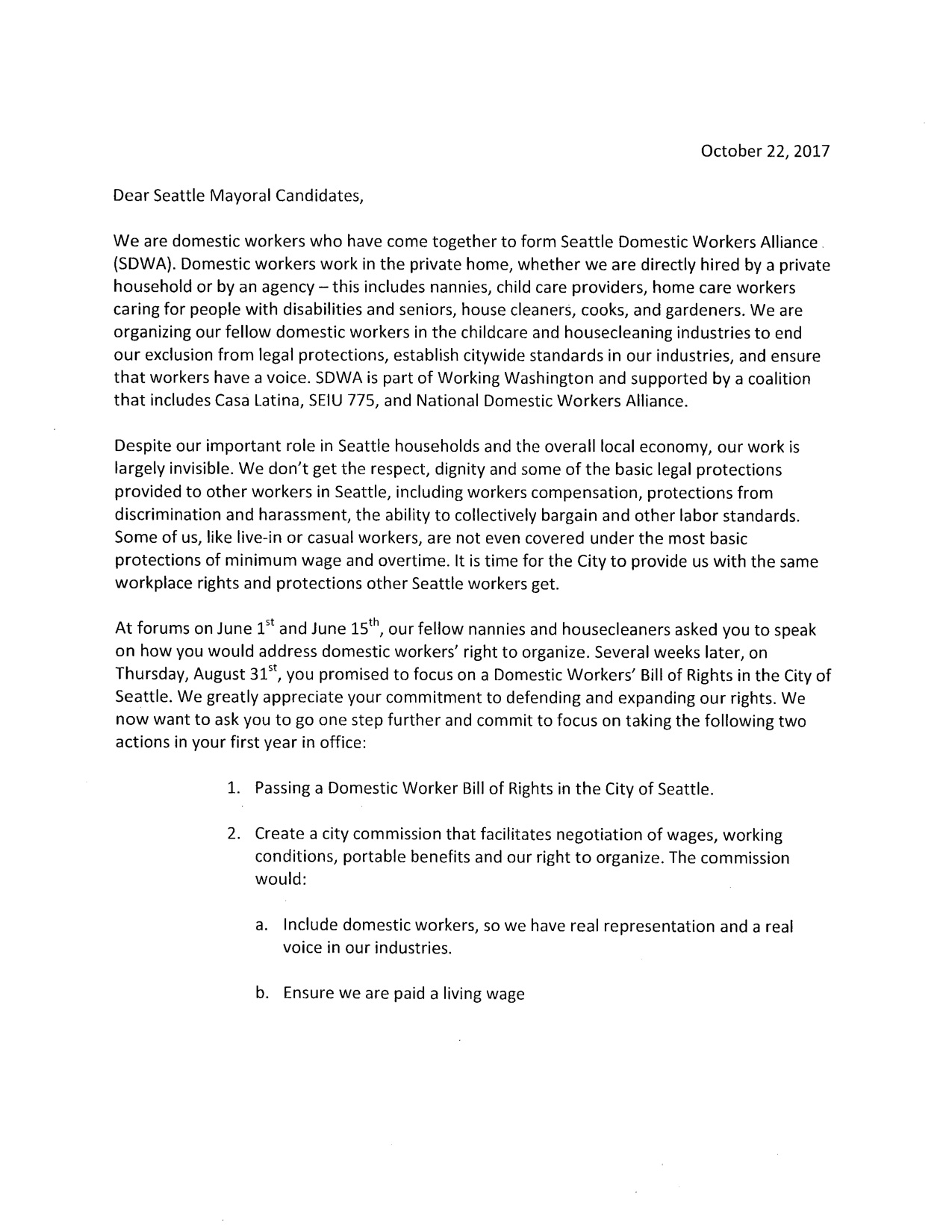Key city councilmembers to attend as nannies and housecleaners launch Seattle Domestic Workers Alliance, kick-off campaign to raise standards in industry
Nannies, house cleaners and other domestic workers from across the city will gather Thursday evening to launch the Seattle Domestic Workers Alliance. Joined by several key City Councilmembers, they’ll kick off their campaign for a citywide Domestic Workers' Bill of Rights which:
- Ensures all domestic workers are covered by all our basic workers’ rights laws.
- Guarantees written employment contracts for all domestic workers.
- Establishes an official city commission which includes domestic workers and has the power to set legally-binding industry standards on wages, benefits, and working conditions.
Who: Nannies, housecleaners, cash paid homecare aides, and other members of the Seattle Domestic Workers Alliance, joined by City Councilmembers Lorena González, Lisa Herbold, and Teresa Mosqueda.
What: Campaign kick-off for a Seattle Domestic Workers' Bill of Rights. Domestic workers will launch the Seattle Domestic Workers Alliance, share their stories, and call for change. Several city councilmembers and a representative of the mayor’s office will attend to offer brief remarks.
Where: Auditorium at 719 3rd Avenue in downtown Seattle, between Cherry & Columbia.
When: 6:30 pm, Thursday, December 7, 2017. Contact Sage Wilson at Working Washington at sage@workingwa.org if you would like to arrange an interview in advance of Thursday evening.
Currently, thousands of nannies, house cleaners, cash paid home care aides, and other domestic workers in Seattle don’t get the full protections of our workers’ rights laws. Few have access to basic benefits like healthcare and retirement. Some types of domestic workers are specifically excluded from the laws that provide these rights and benefits, and for many others the rights spelled out in the law simply aren’t realities on the job. Seattle domestic workers are calling for a Domestic Workers' Bill of Rights that will raise standards and address the inequities faced by a workforce that's mostly women and disproportionately people of color.
Thursday’s kick-off comes after months of organizing and outreach. Nannies raised these issues at several mayoral debates this summer, and as a candidate for office, Mayor Durkan repeatedly stated the need for a Domestic Workers' Bill of Rights, and the importance of enforcing labor standards for all workers. Her campaign later issued a policy paper promising that a Domestic Workers’ Bill of Rights would be a top priority. In the week before the election, nannies and house cleaners leading the Seattle Domestic Workers Alliance met with Mayor Durkan, and she signed on in commitment to work with them to pass a Domestic Workers’ Bill of Rights during her first year in office.
The Seattle Domestic Workers Alliance (SDWA) unites nannies, house cleaners, and other domestic workers across Seattle. Workers have established SDWA a project of Working Washington, with support from Casa Latina, SEIU 775, and the National Domestic Workers Alliance.
###
Contact: Sage Wilson, Working Washington: sage@workingwa.org
Working Washington is the voice for workers in our state. Working Washington fast food strikers sparked the fight that won Seattle’s first-in-the-nation $15 minimum wage. Working Washington baristas and fast food workers led the successful campaign for secure scheduling in Seattle, and our members across the state helped drive forward Initiative 1433 to raise the minimum wage and provide paid sick days. We successfully drove Amazon to sever ties with the right-wing lobby group ALEC and improve conditions in their sweatshop warehouses, and got Starbucks to address inequities in their corporate parental leave policy. And we made history once again with the landmark statewide paid family leave law passed earlier this year. For more information, including our press kit, visit workingWA.org.









